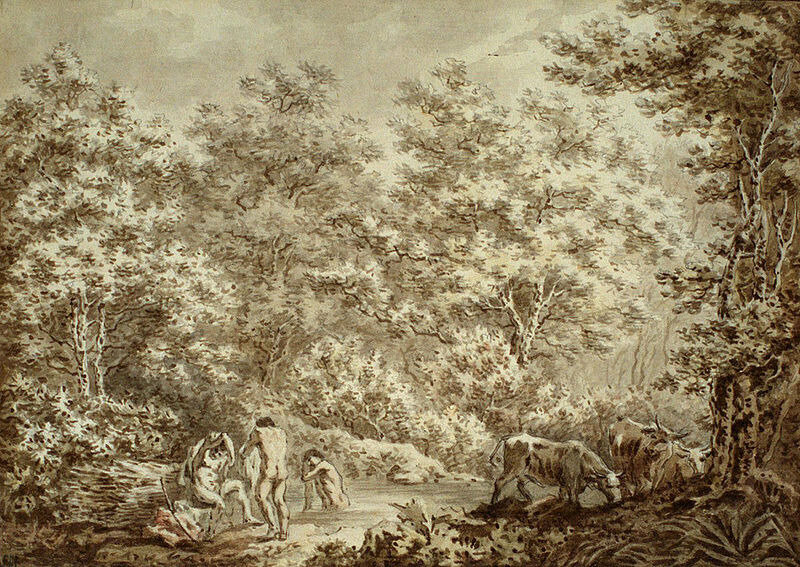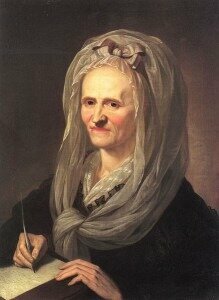 Carl Philipp Emanuel Bach: Keyboard Concerto in D Major, Wq. 13, H. 416 (1744)
Carl Philipp Emanuel Bach: Keyboard Concerto in D Major, Wq. 13, H. 416 (1744)
Approaching the ripe old age of 30, Carl Philipp Emanuel Bach had a steady but poorly paid job with Frederick II, King of Prussia. Away from work, he enjoyed friendships with a number of literati, philosophers and captains of industry in meetings of the Berlin Monday Club. Yet, it was nevertheless time to think about starting a family, something his father, Johann Sebastian would surely have suggested with some kind of frequency.
C.P.E. probably met Johanna Maria Danneman, daughter of a Berlin wine merchant while buying a bottle of claret in her father’s shop.
Following in the relationship footsteps of his father, there is no mention of courtship or love in C.P.E. Bach’s autobiographical sketch. He dryly reports that he married the virgin Johanna Maria in 1744. The blushing bride immediately became a valued member of the Berlin Monday Club, and Anna Luisa Karsch — a natural lyricist who had published a number of poetry collections — provided a poetic welcome.
Woman, let me greet you as a new friend
And three times be greeted by the soft morning kiss
Of your beloved Bach. For all I care he shall
Continue to enrapture you and wake your taste
So that you mildly smile into his eye
Begging for new kisses in abundance
The union produced two sons and one daughter. Johann August Adam Bach apparently had no musical talents whatsoever and became a lawyer.
The second son, born in 1748 and christened Johann Sebastian after his grandfather, enjoyed a promising career as a painter. A student of Adam Friedrich Oeser — who also taught Johann Wolfgang von Goethe and provided the ceiling frescoes in the Leipzig Nikoleikirche — young Johann Sebastian predominantly created brush drawings of idyllic landscapes and historical and mythological scenes, all with or without naked peasants.

Anna Luisa Karsch
C.P.E.’s daughter Anna Carolina Philippina never married, and since his sons did not produce any offspring, this branch of the Bach family terminated in 1804.
C.P.E.’s household functioned suspiciously in the manner of his late father, with a clearly defined manner of dividing labor between husband and wife. This all changed dramatically when C.P.E. Bach died on 14 December 1788. At that time, Johanna Maria was forced into the role of a business woman by having to decide how to deal with the extensive collection of musical manuscripts left in her care; more on that in our final C.P.E. episode.


Dear mr Predota,
Thank you for a very interesting article. I would love to read more, especially about the poet Karsch. Where can I find the original German of her welcome poem?
Thank you in advance
Yours,
Torun
Thank you so much for your interest:
You can find the original German Gedichte by Anna Louisa Karsch under:
https://gedichte.xbib.de/gedicht_Karsch%2C54,0.htm
All the best
Thank you so much for your reply! I am sorry I didn’t notice until now that you had indeed read and replied.
I tried to follow your link, but it is not valid. It would help a lot if you had the title of the original poem in German. I have bought three books around Karsch (one biography and two collections of poems and letters), so I can probably find it there, if I know what to look for. What puzzles me is that CPE got married in 1744, at which time Karsch was still in the Silesian countryside, having babies with horrible husbands. Maybe you referred to the inclusion of Bach’s wife into the Monday club?
My interest stems from being in the process of staging a concert/performance with CPE Bach’s music (flute/viola quartets etc) and a presentation around Karsch’s life. It all sprang out of your article, so thank you so much.
Sorry for bothering you, and thank you so much for your reply.
Dear TT:
We are delighted that Interlude inspired a concert centred on CPE and Karsch, I am sure it will turn out a wonderful event.
Sadly, I do not know the title of the original poem, and there actually might never have been one. Is it possible that the poetic welcome was simply part of some sort of communication, since your research clearly indicated that Karsch was still in the countryside at that time? It is not known to me if such a letter exists or where it might be located.
Attached please find a very comprehensive source for the writings of Karsch.
https://scholarsarchive.byu.edu/cgi/viewcontent.cgi?article=1009&context=sophpm_poetry
All the best,
GP
Thank you so much! I have the book you refer to, it’s an edited publication of Karsch’s poetry, made posthumously by her estranged daughter. As far as I can tell, it does not contain the poem you quote. Would you mind telling me your source? I don’t understand “there actually might never have been one”. You must have read it somewhere?
Thanks again and sorry for the hassle. I just want to be thorough before I bring it to the stage.
Dear TT:
Sorry for the confusion; if the poem was indeed part of a correspondence, it probably never received a title.
Ten years ago when I wrote this blog, I remember consulting a substantial number of sources but have not kept a running bibliography. As such, I can’t tell you the exact source at this moment.
All the best,
GP